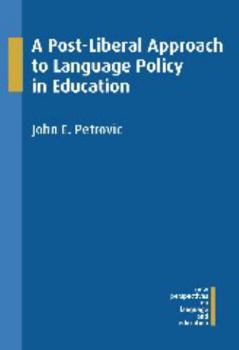A Post-Liberal Approach to Language Policy in Education
(Book #41 in the New Perspectives on Language and Education Series)
This provocative defense of language diversity works through the strengths and weaknesses of liberal political theory to inform language policy. The book presents the argument that policy must occupy the space between 'linguistics of community' and 'linguistics of contact' in a way that balances individual autonomy and group recognition while not reifying 'language'. Drawing on the importance of the language/identity link, the author distinguishes...
Format:Hardcover
Language:English
ISBN:178309284X
ISBN13:9781783092840
Release Date:December 2014
Publisher:Multilingual Matters Limited
Length:136 Pages
Weight:0.70 lbs.
Dimensions:0.6" x 5.9" x 8.3"
Customer Reviews
0 rating





